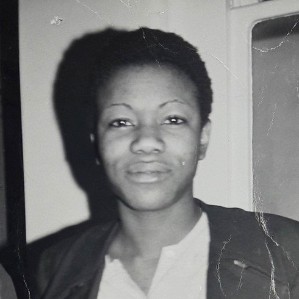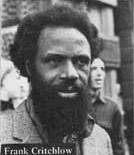Alex Michael Jennings is an English actor of the stage and screen, who worked extensively with the Royal Shakespeare Company and National Theatre. For his work on the London stage, Jennings received three Olivier Awards, winning for Too Clever by Half (1988), Peer Gynt (1996), and My Fair Lady (2003). He is the only performer to have won Olivier awards in the drama, musical, and comedy categories.
Althea is an English female given name. It is a variation of the Greek name Althaea (Αλθαια), which may be related to Greek ἀλθος althos ("healing").
The National Union of Freedom Fighters (NUFF) was an armed Marxist revolutionary group in Trinidad and Tobago. Active in the aftermath of the 1970 Black Power Revolution, the group fought a guerrilla warfare campaign to overthrow the government of Prime Minister Eric Williams following the failed Black Power uprising and an unsuccessful mutiny in the Trinidad and Tobago Regiment.

Leighton Rhett Radford "Darcus" Howe was a British broadcaster, writer and racial justice campaigner. Originally from Trinidad, Howe arrived in England as a teenager in 1961, intending to study law and settling in London. There he joined the British Black Panthers, a group named in sympathy with the US Black Panther Party.

Selma James is an American writer, and feminist and social activist who is co-author of the women's movement book The Power of Women and the Subversion of the Community, co-founder of the International Wages for Housework Campaign, and coordinator of the Global Women's Strike.

Olive Elaine Morris was a Jamaican-born British-based community leader and activist in the feminist, black nationalist, and squatters' rights campaigns of the 1970s. At the age of 17, she claimed she was assaulted by Metropolitan Police officers following an incident involving a Nigerian diplomat in Brixton, South London. She joined the British Black Panthers, becoming a Marxist–Leninist communist and a radical feminist. She squatted buildings on Railton Road in Brixton; one hosted Sabarr Books and later became the 121 Centre, another was used as offices by the Race Today collective. Morris became a key organiser in the Black Women's Movement in the United Kingdom, co-founding the Brixton Black Women's Group and the Organisation of Women of African and Asian Descent in London.
The Mangrove was a Caribbean restaurant in Notting Hill, London, England. It was founded in 1968 and run by civil rights activist Frank Crichlow, eventually closing in 1992. It is known for the trial of a group of British black activists dubbed "the Mangrove Nine", who were tried for inciting a riot at a 1970 protest against the police targeting the restaurant.

Frank Gilbert Crichlow was a British community activist and civil rights campaigner, who became known in 1960s London as a godfather of black power activism. He was a central figure in the Notting Hill Carnival. His restaurant, The Mangrove in All Saints Road, served for many years as the base from which activists, musicians, and artists organised the event.

The Mangrove Nine were a group of British Black activists tried for inciting a riot at a 1970 protest against the police targeting of The Mangrove, a Caribbean restaurant in Notting Hill, West London. Their trial lasted 55 days and involved various challenges by the Nine to the legitimacy of the British judicial process. They were all acquitted of the most serious charges and the trial became the first judicial acknowledgement of behaviour motivated by racial hatred within the Metropolitan Police.

Guerrilla is a British drama television series set in early 1970s London, against the backdrop of the Immigration Act 1971 and British black power movements such as the British Black Panthers and Race Today Collective. It was written and directed by John Ridley and stars Idris Elba, Freida Pinto and Babou Ceesay in leading roles. Guerrilla debuted on Sky Atlantic on 13 April 2017 and on Showtime on 16 April 2017.
The British Black Panthers (BBP) or the British Black Panther movement (BPM) was a Black Power organisation in the United Kingdom that fought for the rights of black people and racial minorities in the country. The BBP were inspired by the US Black Panther Party, though they were unaffiliated with them. The British Panthers adopted the principle of political blackness, which included activists of black as well as South Asian origin. The movement started in 1968 and lasted until around 1973.
Lecointe is a surname. Notable people with the surname include:
Neil Emile Elias Kenlock is a Jamaican-born photographer and media professional who has lived in London since the 1960s. During the 1960s and 1970s, Kenlock was the official photographer of the British Black Panthers, and he has been described as being "at the forefront of documenting the black experience in the UK". Kenlock was the co-founder of Choice FM, the first successful radio station granted a licence to cater for the black community in Britain.

Barbara Beese is a British activist, writer, and former member of the British Black Panthers. She is most notable as one of the Black activists known as the Mangrove Nine, charged in 1970 with inciting a riot, following a protest against repeated police raids of The Mangrove, a Caribbean restaurant in Notting Hill, west London. They were all acquitted of the most serious charges and the trial became the first judicial acknowledgement of behaviour motivated by racial hatred, rather than legitimate crime control, within the Metropolitan Police.

Mangrove is a 2020 historical drama film directed by British director Steve McQueen and co-written by McQueen and Alastair Siddons, about the Mangrove restaurant in west London and the 1971 trial of the Mangrove Nine. It stars Letitia Wright, Shaun Parkes, Malachi Kirby, Rochenda Sandall, Alex Jennings and Jack Lowden.
Leila Hassan Howe is a British editor and activist, who was a founding member of the Race Today Collective in 1973, having previously worked for the Institute of Race Relations. She became editor of the Race Today journal in 1986. Hassan was also a member of the Black Unity and Freedom Party. She is co-editor of a collection of writings from Race Today published in 2019.
Ian Alexander Macdonald QC was a Scottish barrister who was "a pioneer of committed anti-racist legal practice" in the UK. During the 1970s he appeared in many notable political and human rights cases, including those involving the Mangrove Nine, the Angry Brigade, and the Balcombe Street siege. He took silk in 1988 and was leader of the British bar in immigration law for five decades until his death at the age of 80.

Rhodan Gordon was a Black British community activist, who migrated to London from Grenada in the 1960s. He came to public attention in 1970 as one of the nine protestors, known as the Mangrove Nine, arrested and tried on charges that included conspiracy to incite a riot, following a protest against repeated police raids of The Mangrove restaurant in Notting Hill, London. They were all acquitted of the most serious charges and the trial became the first judicial acknowledgement of behaviour motivated by racial hatred, rather than legitimate crime control, within the Metropolitan Police.
The island nation of Trinidad and Tobago is a place of tension between Afro-Caribbeans and Indo-Caribbeans. Around 39% of Trinidadians are of African descent, 40% are of Indian descent and a small population is of European descent. Africans usually live in urban areas, notably the East–West Corridor, and Indians usually live in the rural areas surrounding the sugar cane plantations.
The Universal Coloured People's Association (UCPA) was a black power organisation in the United Kingdom from June 1967 to July 1970.









